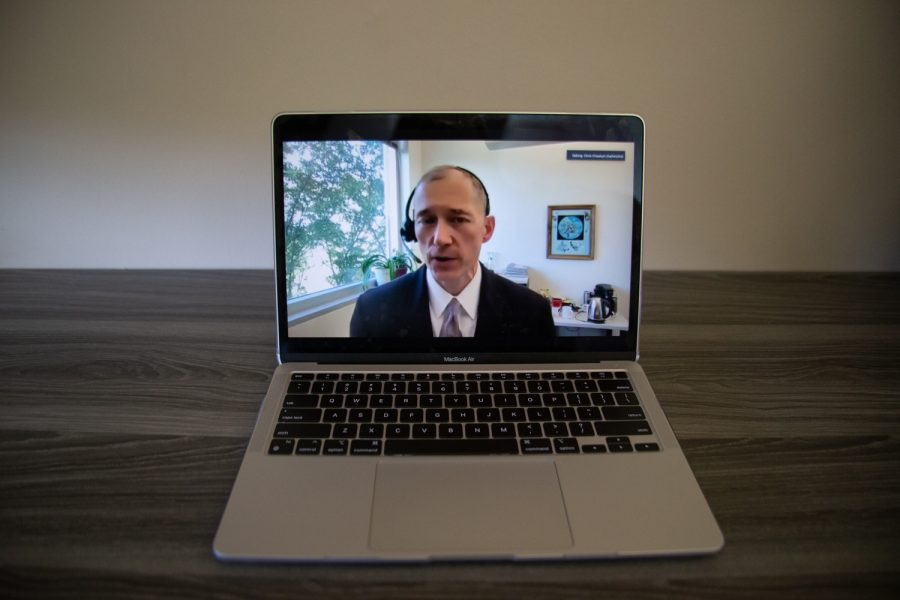Associate Dean for the Natural, Mathematical and Social Sciences search: Chris Cheatum to increase transparency, boost morale among faculty, staff
The final candidate for Associate Dean for the Natural, Mathematical and Social Sciences: Chris Cheatum came before the forum on Wednesday. He spoke on job security and how he cannot promise it when making changes to the budget. Cheatum wants to implement learning leadership and making investments to retain faculty.
Dean Candidate and Professor Christopher Cheatum presents his ideas to utilize financial budgets to address mow morale during a zoom meeting to find the new associate dean of natural, mathematical, and social sciences on Wednesday, Nov. 3, 2021.
November 3, 2021
University of Iowa professor of chemistry Chris Cheatum said if chosen for the Associate Dean for the Natural, Mathematical and Social Sciences position, transparency among faculty and staff will be his number one goal.
Cheatum, who is also the director of the UI’s Materials Analysis, Testing, and Fabrication (MATFab) Facility, is the second and final candidate in the search to fill the associate dean position in the College of Liberal Arts and Sciences. Director of the School of Journalism and Mass Communication David Ryfe, the first candidate, held his forum on Tuesday.
As a staff member for over nine years, he expressed that he would incorporate his values into creating real change in the College of Liberal Arts and Sciences.
Cheatum said low morale has been a problem way before the COVID-19 pandemic even started.
“The pandemic has done nothing to make that better,” he said.
Cheatum said he believes there is a lack of trust toward the collegiate leadership team. He said within the college, there’s a lack of collaboration and there’s a lot of administrative burden.
To earn back the trust of faculty and staff at the collegiate leadership level, Cheatum wants to share all the data — under his leadership, information will no longer be confidential, he said.
“We have avoided sharing data in part because we don’t want to have to explain to people why departments have been treated differently,” he said.
To build morale, Cheatum said he wants to remove burdensome aspects of jobs such as, “clicking work flow all day and trying to find ways to keep up with all the things that are coming at us.”
These aspects make it hard for faculty to be proactive and strategic throughout the department, allow faculty to be creative and grant them the ability to do “what they came here to do,” he said.
Cheatum prefaces the budget crises, budget deficits leave $23 million in debt, and if this fiscal plan continues the CLAS budget will continue to be another $14 million in debt each year.
“The budget crisis is real, and we have to make changes,” he said.
There needs to be significant changes made to the CLAS budget, and 90 percent of the budget is faculty payroll, he said. Cheatum also said in the event of significant budget reductions, he knows he cannot promise job security.
The problem of the budget cannot be solved without affecting jobs, he added.
His budget reduction plan will focus on the idea that reduction in workforce is equivalent to a reduction in workload, meaning that some things will be cut. Cheatum said he urges faculty to be “relentlessly creative” when thinking about what should be kept or cut.
To retain faculty, he said he wants to invest in people who want to build careers here.
Cheatum would be committed to investing in faculty success and particularly to supporting our top performers, he said.
“One of the things we also need to do in our college in terms of guiding departments intentionally through this period is to develop leaders,” Cheatum said.
Cheatum said he will be intentional in equipping his faculty with leadership skills, such as problem solving, strategic thinking, values-based decision making, reforming systems for equity and inclusion, managing conflict, team development, and learning to listen.
He added that leadership is very rarely taught in graduate school or in their professional lives prior to their arrival at the college.
“Leadership is a skill that can be learned, like anything else, but if we don’t develop that skill in our faculty, we can’t be surprised when [there are] so few of them when it comes time to appoint DEO’s or associate deans,” he said.
He added that if chosen, he will be an associate dean that supports and values his faculty.
“I am excited about this position because I have hope,” he said. “I think our college is made up of a really outstanding group of people, really smart, and really capable people who want to belong to a place that values their input.”



